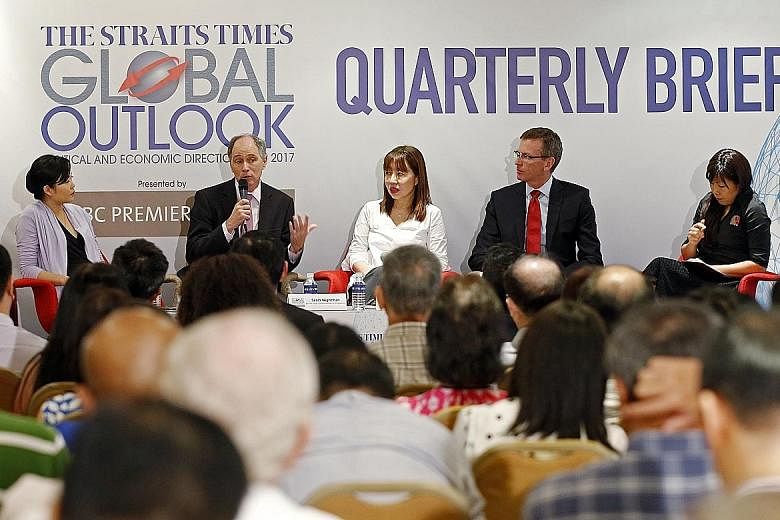Britain's road to Brexit is paved with uncertainty and complications - from when Prime Minister Theresa May will trigger the break from the European Union to what kind of relationship London will forge with it.
But panellists at the third quarterly briefing of The Straits Times Global Outlook Forum yesterday felt that the decades-old attractiveness of the country as a global financial and cultural hub would cushion the bumpy ride.
ST foreign editor Audrey Quek offered clues as to what to watch out for as the world waits for the British government to take the next step, following the June 23 Brexit vote. For starters, read Mrs May's lips. She is due to address a meeting of her Conservative Party in October and may spell out her vision beyond her cryptic "Brexit means Brexit" comment last month.
Mrs May may talk about plans to help Britain make the transition to a post-Brexit world, which includes rebalancing the economy, which is seen as too focused on London at the expense of marginalised towns such as Boston and Blackpool that voted to leave the EU.
She may also drop a hint as to when she will begin the Brexit proceedings. Observers believe the signal will be given only after national elections are held in the Netherlands, France and Germany late next year. Given the two-year limit of the "divorce proceedings", Brexit will not take place until 2019.
The date aside, the terms of the divorce are much debated. Many Britons want a "hard Brexit" - they will not barter continued migration from the EU in return for access to its single market. Never mind if that means British goods will face tariff barriers and financial services will suffer. Others such as bankers and even small business owners are pushing for a "soft Brexit" - they want Britain to make concessions in order to access the EU market as well as its cheap workers.
But one thing yesterday's panellists agreed on was there would be no looking back, no second referendum and no early general election to put the issue to a vote again.
Nearly 200 people attended the event held in partnership with sponsor OCBC Premier Banking. Aside from Ms Quek, other panellists were British High Commissioner Scott Wightman, Bank of Singapore's chief economist Richard Jerram and ST's assistant foreign editor Tan Dawn Wei.
Another poser for the panel, from ST managing editor Fiona Chan, who moderated the discussion, was: Once the link is severed and Britain loses its role as a gateway to Europe, would it still appeal to investors as a standalone country?
Mr Wightman cited a study, conducted before the referendum, which asked foreign investors to rank the factors most important to them in selecting the UK as an investment destination. Access to the single market ranked seventh, he noted, trailing factors like Britain having the most flexible labour market in Europe, its store of creative talent, the position of the City of London and good infrastructure.
Ms Tan, who shared her experience of reporting on the referendum and its aftermath, likewise called herself optimistic, pointing to Britain's long history and ability to absorb shocks.
Mr Jerram agreed, though he also noted that Britain would seem less shiny as long as there was uncertainty about Brexit. "Banks will put in contingency plans, preparing to put 5 to 10 per cent of their business elsewhere just in case there is deterioration in relations with EU."
He expected the economy "to be 2 to 3 per cent slower by the end of next year than it is today, a big decline". But the recent interest rate cut and the end of Britain's austerity regime will help, as will the British pound's big drop, which will yank the economy out of recession in the second half of next year.
In the longer term, however, Mr Jerram said: "If you limit free trade and free investment flows, there will be economic damage."


